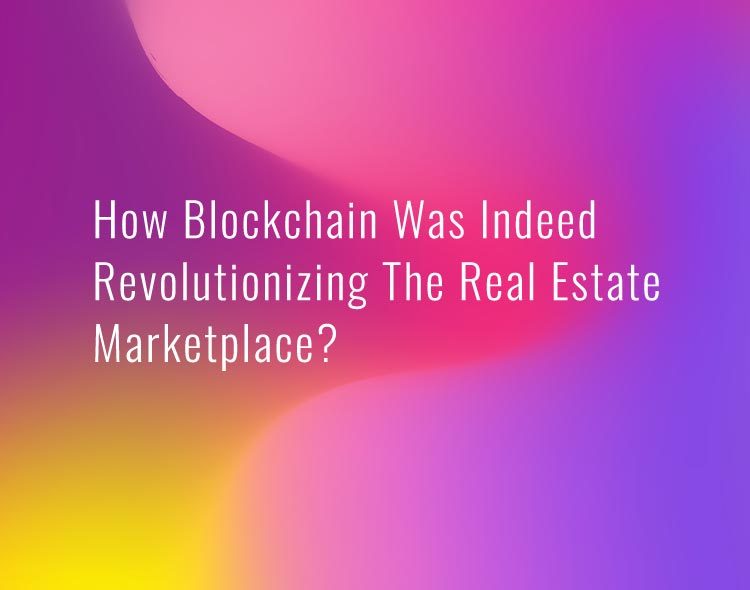The real estate industry has also been disrupted by blockchain technology. Historically, it was not common to transact high-value assets such as real estate via digital channels, as these transactions were typically conducted offline through face-to-face conversations. This new regular blockchain has created numerous opportunities to alter conventional channels. The introduction of smart contracts in the blockchain space has enabled the tokenization of real estate, enabling it to be traded similarly to cryptocurrencies.
A Brief Overview Of Blockchain Technology In Real Estate transactions
Since 1910, real estate agents have served as intermediaries. The agent is used to establish a level of trust between the parties because he or she is regarded as an authority on local regulations. So that they can confirm the seller’s ownership of the property and the buyer’s ability to pay for it. However, the blockchain gradually altered the process. In January 2009, a small group of individuals using the alias Satoshi Nakamoto released the first version of bitcoin and the blockchain database. In Vermont, the United States witnessed its first blockchain-based real estate transaction in 2018.
How Does Blockchain Technology Affect Real Estate?
This domain is revolutionized by blockchain technology, which has simplified transactions for both buyers and sellers. Through its online platform, blockchain enables sellers to list the digital shares of their property, resulting in the information being readily accessible on a decentralized database that anyone can access in real time. Once a buyer and seller make contact, they can access all pertinent information, such as the property’s price, etc. Then, they can legally enter into a smart contract and conduct a secure transaction.
Read Latest Article: All About Fintech Startups
Blockchain Real Estate: Do Tokenized Systems Have Any Limits?
One of the astonishing facts about blockchain is that it’s often challenging to tell where the technology will end up. Although most people have the desired awareness of blockchain’s potential to revolutionize the financial domain, its potential implications for the real estate industry are often overlooked and underrated. That said, there are a number plethora of ways in which blockchain will change the future of the real estate domain, for good. One way out is the tokenization of assets by which an asset is converted into a digital token that can be easily traded on a blockchain online platform. Thereby allowing for fractional ownership of assets and liquidity as well. The other probable solution could be in which blockchain could change the real estate sector is via smart contracts which are self-executing contracts and are stored on a blockchain online platform. They can be used for the automation of various transactions. Smart contracts can also be used by blockchain-based platforms in bulk which can be used to verify paperwork layers in a more productive way.
Strategy Of Blockchain Real estate
Step 1: Real Estate Market
This is a common online marketplace platform where the lessor and lessee will meet with their verified data about the property in a transparent manner, such as the owner’s information, geo-location, a chain of custody, etc. This platform will be integrated with government systems, which will guarantee the authenticity of online data.
Read latest article: Best Loan CRM Software
Step 2: Verification of identity
The online real estate marketplace will incorporate a new Blockchain identity verification framework, which will involve third-party verification entities, government agencies, banks, and investors. This module will assist in validating data from multiple sources, such as banking transactions.
Step 3: Immutable Agreements
When both parties decide to proceed with the contract and wish to enter into it, the terms and conditions will be recorded in the online Smart Contract platform.
Step 4: Independent Payouts
The lease payout will be credited to the lessor’s account in accordance with the Smart Contract’s terms and conditions. All data must be recorded in real-time on Blockchain so that it can be utilised for data analysis. Actual Blockchain Real Estate Examples
Blockchain is proving to be an ideal solution for the vast majority of Real Estate problems. The Swedish land registry authority and a group of banks, businesses, and startups are nearing completion of a Blockchain real estate pilot. States such as Arizona and Vermont are on the verge of adopting Smart Contracts as authentic points of reference for real estate transactions in the United States. ShelterZoom, a New York-based startup, is about to launch a real estate application that enables buyers and sellers to conduct transactions on a blockchain-based online platform. This online platform has made it possible for sellers, buyers, and real estate agents to view and accept all offers in real time. In addition, Deedcoin has reduced the commission on real estate transactions by 6%, allowing buyers and sellers to connect. Ubiquity has developed a Blockchain-based, SAAS-based real estate platform that enables users to securely record property information and track the chain of ownership. In addition to Propy, Harbor, BitRent, Averspace, Blocksquare, Atlant, CryptoProperties, BrikBit, and SMARTRealty, there are a number of other blockchain-based companies working on similar projects.
What Lies in Store?
Despite the fact that this technology is still in its infancy, the use of blockchain in the real estate industry is extremely exciting. By eliminating the need for paperwork, audits, and insurance whenever possible, these tech-enabled brokerages reduce the costs of intermediaries, such as real estate agents and bankers.
Read latest article: The New Wave: Decentralized Finance
[To share your insights with us, please write to sghosh@martechseries.com]
